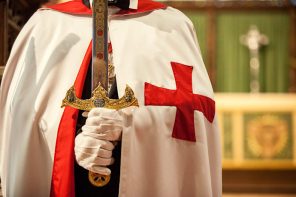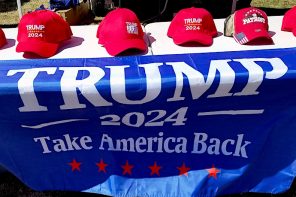As they say, what’s good for the goose is good for the gander. But is that true when it comes to the legal defenses available to religious believers?
A trial that opened Monday in a federal court in Georgia will show whether legal exemptions on the basis of religious freedom are as open to the politically liberal as they are to conservatives.
The trial concerns the actions of a group of Catholic peace activists, the Kings Bay Plowshares 7. In April 2018, they broke into the Trident nuclear submarine base at Kings Bay, Georgia, where they carried out what they dubbed an act of symbolic disarmament in protest against the U.S. military’s continued possession of nuclear weapons. As Sam Husseini wrote in The Nation, “[they] brought hammers, small bottles of blood, spray paint, and crime scene tape, which they strung across the facility.” Charged with several federal crimes, they face more than twenty years in prison if convicted. (Disclosure: My Fordham University faculty colleague Dr. Jeannine Hill Fletcher testified on the activists’ behalf at an earlier stage of the proceedings.)
The Plowshares 7 maintain that their Catholic faith motivated not only their opposition to nuclear arms but also the specific, sacramental approach they took in their protest. Last spring, their attorneys argued that the charges against them should be dismissed became they impinge upon the Plowshares 7’s religious freedom. This claim rested on the Religious Freedom Restoration Act (RFRA), a 1993 law that requires the federal government not to “substantially burden” someone’s practice of religion unless a “compelling government interest” is involved and the rule the government is enforcing is the “least restrictive means” of achieving its goal.
The judge in the Plowshares trial denied the motion for dismissal, opining that the government had no less restrictive means of ensuring the safety of the base and its weapons than vigorously prosecuting those who trespass. The activists’ attorneys subsequently requested that they at least be able to present evidence concerning their religious motivations. The judge denied that motion too, at the end of the last business day before the trial was scheduled to get underway.
The Plowshares trial is one of a handful of cases that have unfolded across the country in recent years that upend the conventional religious freedom narrative. Far more frequent have been disputes in which politically conservative religious actors have sought exemptions from laws that, in their view, mandate their complicity in the provision of contraception or abortion services, the celebration of same-sex weddings, or the placement of adopted and foster children with same-sex couples, LGBTQ individuals, and non-Christians. Neither federal nor state courts have treated such cases consistently.
Where the shoe has been on the other foot, in the few cases where politically liberal actors have claimed that their religious beliefs compel them to violate the law, courts have typically been unwilling to find that such convictions constitute a valid defense. As in the Plowshares trial, earlier this year a federal court in Arizona denied a RFRA defense brought by an activist with the No More Deaths movement who had provided humanitarian aid to undocumented migrants who had crossed the southern border. This landscape is not all bleak, however: courts have found for some non-Christians seeking religious exemptions, such as a Sikh who successfully sued the Army in 2015 over a grooming code that would have required him to shave his beard and remove his turban.
Justice, not to mention old wisdom about geese and ganders, demands that our judicial system should treat like cases alike. Either sincere religious conviction should be a defense, or it shouldn’t. There should be a healthy debate about the place and extent of religious exemption in contemporary, pluralistic societies. The content of the religious conviction concerned, however, should not be at issue. And the question as to whether the government has no equally or less burdensome way of achieving its objectives should be a real inquiry, not a fig leaf.
In practice, however, it seems that certain kinds of religious beliefs have tended to attract greater sympathy than others. Disputes involving employers and shop owners with conservative views have received far more attention than those involving liberal activists like the Plowshares 7. To a certain extent, this is a function of demographics: it’s simply the case that there are more citizens who belong to religious institutions that teach them to defend religious liberties in terms commonly understood as conservative. Culturally, as well, the idea of the lone believer standing up against a supposedly secularizing government has longstanding cachet.
But if the degree of religious freedom that we afford a person depends on the content of her beliefs, the goose and the gander are no longer on the same table.
Those who have fought long and hard for the rights of small business owners, wedding vendors, and physicians to follow their conscience even when it conflicts with the law should have been the first to stand alongside the Kings Bay Plowshares 7 and the No More Deaths movement, and to argue for their freedom. (And vice versa. The ACLU, interestingly, was one of the original advocates for the Religious Freedom Restoration Act but has in recent years warned against its use as a license for discrimination.)
Such usually thunderous voices have included the current U.S. Department of Justice, prominent evangelical and Catholic leaders, and well-funded think tanks and advocacy groups. If they continue to keep silent when left-leaning religious activists are on trial, yet persist in intervening vociferously at other times, then not only legal analysts but the public at large must draw the only fair conclusion: this is not religious freedom but religious favoritism.





